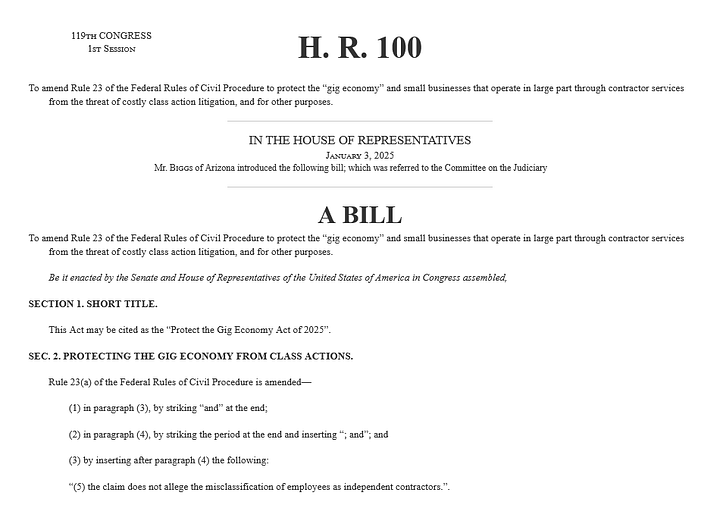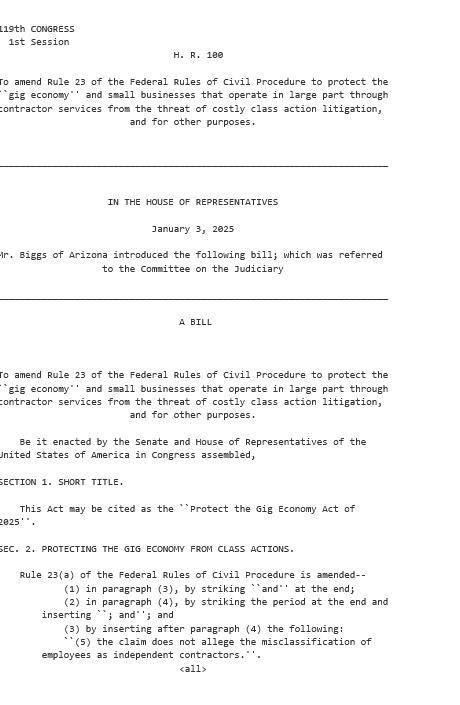It’s been OMB director Russell Vought’s shutdown all along. It began with the first unlawful impoundments and mass firings of federal staff employed in places “not consistent with the President’s priorities,” a favorite phrase of this Administration. As we mentioned recently, the quiet shutdown is already underway: twelve percent of all federal civilian employees will lose their jobs by the end of the year, and key federal agencies have been dismantled or destroyed. The President, of course, is not the only figure allowed to set priorities in our constitutional system. Congress, actually, sets the priorities that the executive branch faithfully executes.
Vought and other evangelists of a school of constitutional thought claim they are fighting against a bureaucracy that the Constitution’s authors never intended to exist and that actually governs the country. Vought wrote for the Claremont Institute in 2022 that the Right needed to “be radical in discarding or rethinking the legal paradigms that have confined our ability to return to the original Constitution.” Congress, here was part of the problem because it delegated so much to the executive branch while keeping “their thumbs on the scale toward their preferred policy approach.” Furthermore, agencies and congressional appropriators created feedback loops that cut presidential desires out, all the while being “influenced by the values and milieu of a permanent ruling class in a capital city divorced from the everyday concerns and wishes of the American people themselves.”
If you are willing to believe Vought’s arguments are grounded in more than will to power, his articulation of a bitter, angry vision of governance is openly at war with the Wilsonian state American voters have accepted, at least to some degree, for more than a century. During this administration, Vought has expressed his radical countermajoritarianism through action, unlawfully dispatching one in nine federal employees for termination by the end of the calendar year, “impounding” billions in appropriated funds, and “cancelling” hundreds of billions more.1
The shutdown provides another opportunity for action, even though agencies have no legal authority to layoff federal workers during one. In fact, Vought’s fellow travelers argued before the start of the new administration that the White House should instigate a prolonged shutdown in order to force Congress to reauthorize programs with “permanent authorities (not appropriations) that increase political control over the bureaucracy” by the president.
Vought’s memo to agency heads calling for mass layoffs in the case of a shutdown, therefore, is merely a continuation of the same action plan, reframed through the partisan nature of the conflict on Capitol Hill. (In fact, a February OMB memo mentioned a second phase of layoffs that should be planned to be implemented by September 30.) Last week’s notice mentions Democrats six times in a little more than a page, trying to shift blame for something the Administration aimed to do all along. The semantics of which workers are “essential” and which are “nonessential” are a convenient way to demonstrate, as one administration ally said to Politico, “that there is bloat and excess within the government.” Never mind that the Office of Personnel Management defines “essential” as positions connected to emergency management or public safety, or those not funded by appropriations.
The White House will pick and choose based on its policy priorities, targeting areas where it has fundamental disagreement about the role of government in programs authorized by Congress. At EPA, for example, only 1,260 staff out of a workforce of 16,700 were designated “exempt” before the potential shutdown last March. The rest are plum targets for layoffs. A former Department of Interior supervisor warned that all land management staff would be at risk of layoffs under the OMB memo.
Nine months into the assault on congressional constitutional authority, Vought’s overreach may result in real pushback. Many leading Democrats immediately dismissed Vought’s memo as an intimidation tactic. (Republican) Senate Appropriations Committee chair Susan Collins defended federal employees who were being used as “pawns.”
The White House has further eroded its standing because it’s almost impossible even for Congress to understand how much appropriated money is set to expire. NOTUS reported that billions of dollars are “virtually untraceable” because of faulty data and vague notifications. Who is responsible for providing accurate data and proper notifications to Congress? Why Vought’s OMB, of course. Sen. Lisa Murkowski said she got information “by reading something in the newspaper” about spending. EPA brass, according to NOTUS, deliberately withheld notices of cancelled grants from Congress. This reporting comports with a report by the Center on Budget and Policy Priorities we highlighted last week that spending on some programs is about $26 billion behind where it should be heading into the end of the fiscal year.
Brendan Buck, who served as counselor to (Republican) Speaker Paul Ryan and as press secretary to (Republican) Speaker John Boehner, wrote on Friday: “This is the moment for members of Congress to stand up and defend their institution. Whether before or after a government shutdown, Congress will ultimately send the president a bill that funds the government.” Congress, he argues, must hold the executive in check, and the power of the purse is Congress’s most important tool to do so.
Vought’s insertion of himself into the shutdown struggle reiterates that whatever the sides decide on the other issues at hand, reassertion of congressional authority over program authorizations and funding must be part of the final outcome. Speaker Johnson’s decision to keep the House out of session as the clock ticks down will look to voters like House Republicans are on vacation when the government shuts down, a perception exacerbated by the presence of House Democrats on the Capitol campus and refusal of Trump to meet with a congressional delegation. (It also defers Johnson’s reckoning with the Epstein files, an issue that is causing his coalition to fray.)
There is no point for Senate Democrats (or Republicans, for that matter) to negotiate or vote for a spending bill, short term or otherwise, unless it resolves or leads to the resolution the issues of impoundments and restricting further withholding of funds, reinforces GAO authority to investigate and litigate impoundments, places political shackles on Vought (such as a new Inspector General at OMB), and requires regular, accurate reporting of agency spending.
House senior Republican appropriator Steve Womack noted that while some moderate Democrats’ “predisposition might be to help negotiate with Republicans on a funding mechanism, why would you do that if you know that whatever you negotiate is going to be subject to the knife pulled out by Russ Vought?” Why indeed.
MODERNIZATION
Easier-to-read slip laws on Congress.gov. The Library of Congress announced it has made slip law text available on Congress.gov in a BETA USLM format, which makes them able to be read more easily than previous plain text versions. Slip laws are the first published version of new laws and often include notes in their margins that cite laws and U.S. Code classifications mentioned in the text. Documents from the 113th Congress forward are available. What this means to you: when you copy and paste the bill text from Congress.gov, not only will it look better, but it will have normal line breaks.
Here’s a side-by-side comparison.


Volunteer to improve Congress.gov. The Congress.gov design team is looking for seven to 10 volunteers to provide user experience insights via an hour-long virtual interview session. During the sessions, which will be scheduled for the weeks of October 20 and 27, team members will observe volunteers as they use Congress.gov and other online tools and websites to complete tasks. The team is looking for volunteers with different job roles and levels of experience with Congress.gov to inform new improvements for all users. More information is available on the LoC blog.
Library of Congress public forum. Don’t forget that the Library of Congress is hosting its annual public forum on Congress.gov September 30 from 1:00 to 3:00PM, which can be attended in person or virtually. We will recap the event on the Congressional Data Coalition website. Please join if you can. If you have comments on Congress.gov and cannot attend, please complete this website user feedback survey or submit a comment for the Congress.gov API. They read every comment, and question #5 of the survey is where to submit your ideas.
ODDS AND ENDS
Capitol security. Congress is on track to spend more than a billion dollars on its own security via the U.S. Capitol Police. The more we think about it, the more we believe that Congress must fundamentally overhaul its security system. We had assumed, for example, that other law enforcement agencies and the national guard would come to Congress’s rescue in an emergency. We had assumed that the intelligence apparatus would share information with the Capitol Police through the fusion centers. We had believed that the Department of Justice would prosecute criminal threats and actions aimed at Members of Congress and their staff. As we take measure of the tenor of the current times, a strong case can be made these conclusions can no longer be assumed.
Members of Congress and their staff are rightly afraid for their safety. The insecurity they fear is a heightened version of the insecurity we all feel as a consequence of decisions … by Congress. Oh, the irony. We recommend the following steps:
The Capitol Police should draw from an additional source of funding besides non-defense discretionary spending contained inside the Legislative Branch Appropriations bill. Whether this is defense discretionary spending, mandatory spending, or something else is something they should work out. Congressional security should not lapse even when the appropriations process fails.
Funding for Member home or personal security should not be drawn from the same account as that which pays staff. There should not be a trade-off between paying staff properly and personal security.
The committee offices that oversee the Capitol Police should be afforded sufficient funds for dedicated staff with expertise in security and law enforcement to oversee USCP operations.
The Capitol Police Board, which has only one staffer, should be provided additional staff.
The Capitol Police Inspector General should be made fully independent of the Capitol Police and be given the responsibility of overseeing security measures for all of Congress.
The Department of Justice cannot be trusted to prosecute threats to Congress. Measures should be taken to create an independent prosecution authority separate from DOJ or to provide additional prosecutors inside the DOJ that are independent of the president’s personal whims and focused on congressional security.
Constitutional amendments. Hurry to the National Archives and see all 27 amendments to the Constitution displayed together for the first time ever. The display ends October 1, or perhaps the day before if the government shuts down.
Library of Congress annual report. The Library of Congress just published its FY 2024 annual report, which includes the most up-to-date organizational chart on page 50. For those keeping track FY 2026 starts on Wednesday. We cut the Library some slack because of the recent kerfuffle, but the report was already behind even before the Trump administration started. The Congressional Research Service has not published its FY 2024 report. (We have all the earlier ones here.)
First Branch Forecast Insecurity. Among the many things coming out of the White House this past week is a memorandum attacking nongovernmental organizations. With Trump’s recent directives to prosecute his political enemies — and anyone else who speaks out — we can only wonder what will happen to civil society organizations, including ours. As some foundations become more cautious about grantmaking, support from private individuals becomes more important. If you have not already, please subscribe to this newsletter and consider donating to the American Governance Institute.
The First Branch Forecast is a production of the American Governance Institute. Chris Nehls is the primary author and Daniel Schuman is the editor.
If you think the Supreme Court is going to save us, they’re not.


